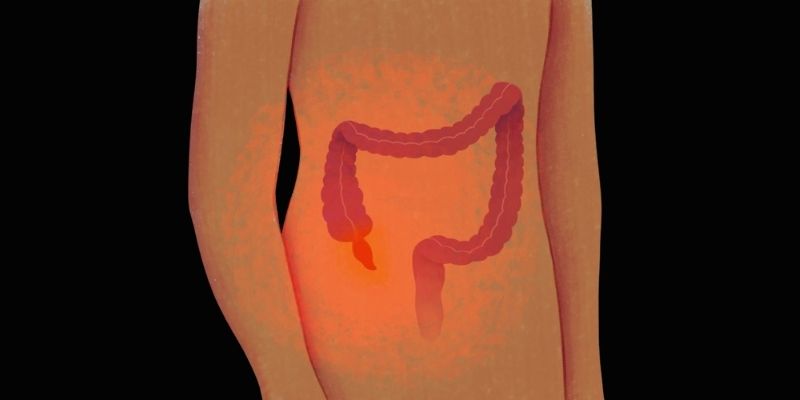Appendicitis is a medical emergency that requires immediate attention. Understanding the signs and symptoms of appendicitis helps ensure early care. Many people ignore early warning signs, leading to serious complications. Recognizing the specific symptoms can help prevent complications and save lives. Common early symptoms include a mild fever, nausea, and abdominal pain. Early recognition of these can result in prompt therapy. If left untreated, a ruptured appendix can cause potentially fatal infections.
Learning the warning indicators ensures faster visits to hospitals. You should pay attention to when a stomach ache becomes concerning. Ignorance of symptoms like vomiting or lower right abdomen discomfort might be dangerous. Stay aware of what might be causing severe appendicitis symptoms and abdominal pain. Listen to your body's warning signs and act quickly.

Abdominal Pain That Starts Near the Navel
Appendicitis pain typically begins near the belly button. At first, the pain could seem dull. The pain moves over time to the lower right side of the abdomen. Over several hours, the pain usually becomes sharper and more intense. Coughing or sudden movement could aggravate the pain. Many sufferers define their suffering as extreme and non-stop. Usually, relaxation or medication cannot cure it. One should not dismiss pain beginning close to the navel.
This pain is often one of the first signs of appendicitis. Adults and children may experience the pain differently. In young children, the suffering could cause a curled-up posture or sobbing. When walking or bending, adults could feel pressure. Look for changes in the pain's sensation. Pain that moves and gets stronger points to a medical emergency. If abdominal trouble persists, get care right away. Pay attention to changes in the location or intensity of pain and seek prompt medical help.

Loss of Appetite and Nausea After Pain Begins
Many times, appendicitis causes a sudden loss of appetite. Nausea typically begins a few hours after the onset of abdominal pain. Vomiting may occur suddenly and without warning. These symptoms start when the stomach hurts. Food loses appeal even if you were hungry just now. Some people report a feeling of bloating or heaviness in the stomach. Sharp pain, together with nausea, begs questions about appendicitis. The body naturally wants to avoid eating.
Under inflammation, digestive processes slow down. Commonly, one feels full after eating very little. Once or again, vomiting could start without notice. Don’t ignore these signs—take action if they appear soon after stomach discomfort. Young children could cry and refuse to eat entirely. Not eating could make adults weak and lightheaded. If nausea lingers for more than a few hours, medical treatment is required. When abdominal pain is accompanied by nausea and vomiting, it may signal a serious case of appendicitis.
Low-Grade Fever Accompanied by Digestive Issues
A low-grade fever may appear in the early stages of appendicitis. This fever is the body's natural response to infection. Early phases of the fever usually stay below 101°F. Fever could somewhat increase as an infection develops. As the disease gets bad, chills or sweating may ensue. A low-grade fever by itself might not cause anyone great concern. But it gets dangerous when paired with nausea and stomach ache.
Additionally possible are constipation or diarrhea. Others get gas they cannot pass or feel bloated. The abdomen may feel bloated, tight, or tender. A warning indication is a fever accompanied by stomach difficulties. Your body is battling infection right next to the appendix. Ignored, an infection can spread rapidly. You may also experience chills despite having a fever. Children could refuse to move or feel very fatigued. Many times, adults find their abdomen to be painful. A little fever accompanied by stomach problems calls for attention.
Rebound Tenderness and Sharp Localized Pain
One obvious clue of appendicitis is rebound discomfort. Pressing on the tummy might not hurt very much. But when you release the pressure, you feel sudden, sharp pain. We term this pain reaction rebound tenderness. Usually, it arises in the lower right abdomen. The area is touch-sensitive. One can be uncomfortable even with low pressure. It's worse when you walk or cough.
Lying down may temporarily relieve, but movement often worsens the pain. But with every movement, the agony comes back fast. Over the painful area, the skin could feel heated. You could find tightness or puffiness all around. Usually focused, pain does not migrate anywhere. Over time, the place gets more agonizing. Ignoring this suffering can cause problems. It indicates inflammation of the appendix. Early identification helps the appendix not to explode. Avoiding major issues is mostly dependent on quick care.
Unusual Urinary or Bowel Symptoms
Appendicitis can affect more than just the digestive system. Some people experience unusual urination. One could have discomfort during urinating. You could find yourself wanting to go often. Sometimes, nothing shows up at all. Bowel habits might change all at once. Some people have problems passing gas or diarrhoea. Some feel bloated or backed up. Many people find great confusion in these symptoms. They do not always connect them to appendicitis.
Still, inflammation might linger in the bladder or intestines. It brings issues beyond the appendix itself. You may also feel pressure in your pelvic region. Women may mistake the pain for menstrual cramps. Men could be in agony close to the groin. One should pay attention to changes in bowel motions and urine. When these symptoms occur alongside abdominal pain, appendicitis should be considered. Neither ignore them nor wait too long. See a doctor straight away if they seem to be suddenly present. Early therapy stops the problem from getting worse.
Conclusion:
Recognizing the symptoms of appendicitis can save lives. Acting early helps to avoid major medical risks. Warning indications are pain close to the navel, nausea, and fever. Remain vigilant for the causes of adult appendicitis and severe stomach pain. Early action lowers the possibility of a burst appendix. Don't discount the messages your body sends you. Seek medical help if the pain intensifies or changes location. Early recognition of the signs produces safer results. Appendicitis can progress rapidly, so stay informed. Early identification reduces surgical risks. Get yourself and your loved ones covered with fast medical attention.












